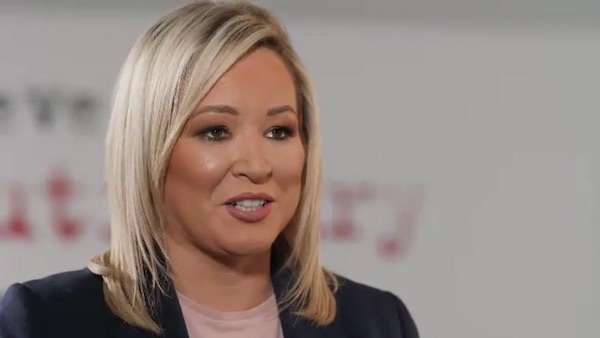
Sinn Féin’s Michelle O’Neill has said the days of democracy in the north of Ireland “on the terms of unionism alone” are over as speculation persists that the DUP will block a return of power-sharing if Sinn Féin becomes the largest party in May’s election to the Stormont Assembly.
Recent polls have put Sinn Féin at between 23% and 25% of first preference votes among decided voters, ahead of the Democratic Unionist Party (DUP) on 17% to 19%. If the results carry into the Six County election, it would put Ms O’Neill on course to become First Minister.
While the First and Deputy First Minister are joint positions and hold exactly the same power, the prospect of Sinn Féin claiming the title of First Minister could prove an impossible challenge to unionism’s sense of supremacy. The DUP have said they could also refuse to allow a return of the Stormont Executive if their demands on Brexit and Irish language legislation are not met.
When asked about a potential DUP boycott, the Sinn Féin vice president said it will be up to the people to decide who they wish to govern. SHe said it was crazy to ask if the north of Ireland is “ready” for a Sinn Féin First Minister.
“[The people] will decide who will be the largest party,” she said.
Alternatives to the current Stormont arrangements could take the form of direct rule from London, joint authority of the North by both Dublin and London, or an increased role for other unionist parties.
Speaking to Sky News, Ms O’Neill said it was too early to talk about alternatives.
“When it comes to whether or not there should be a different form of government, you have to remember that we are a society coming out of conflict and we have special and unique circumstances here,” she said.
“So we can’t be looking towards different systems right now.
“The Good Friday Agreement was an agreement that a lot of people put a lot of hard work into - nationalist and unionist, republican and loyalist.
“A lot of sweat went in to bring about a peace agreement.
“That’s something that I hold very dearly and that’s something I will protect at all turns so I believe in the system of governance is a necessary piece of governance because of where we came from.”
Fringe demands by unionists in recent weeks include limiting nationalists from obtaining white-collar jobs, as well as a “decontamination” of Sinn Féin from any past association with the Provisional IRA.
Former DUP leader Arlene Foster has also raised unionist fears over Sinn Féin gaining the mostly symbolic post of Stormont Justice Minister following the next election.
Ms O’Neill described the increasingly erratic demands of unionist politicians as “madness”.
“I come from a background - I’m a republican, I’m a proud republican, I’m somebody who I believe can govern for all people. Not just those with a republican tradition but those with other traditions,” Ms O’Neill said.
“So to sit here in 2022 for anybody to question a nationalist’s ability to be First Minister, to hold a position in the legal profession, to hold the position of justice ministry, it’s just absolutely madness. Those days are gone.”
The former deputy First Minister also said she believes the possibility of a united Ireland is closer than it has been previously and said it is time to start planning and putting preparations in place.
“Let’s start to have a healthy conversation about the things that matter everyday to people,” said Ms O’Neill.
“What does the health service look like in a united Ireland? What does education look like in a united Ireland?
“I think this is a hopeful conversation because our society here has lived apart for far too long.
“If the last couple of years of Brexit has taught us anything is that the Tories will never prioritise the interests of the people here whether they be unionist, nationalist or other.”
![[Irish Republican News]](https://republican-news.org/graphics/title_gifs/rn.gif)
![[Irish Republican News]](https://republican-news.org/graphics/title_gifs/harp.gif)

